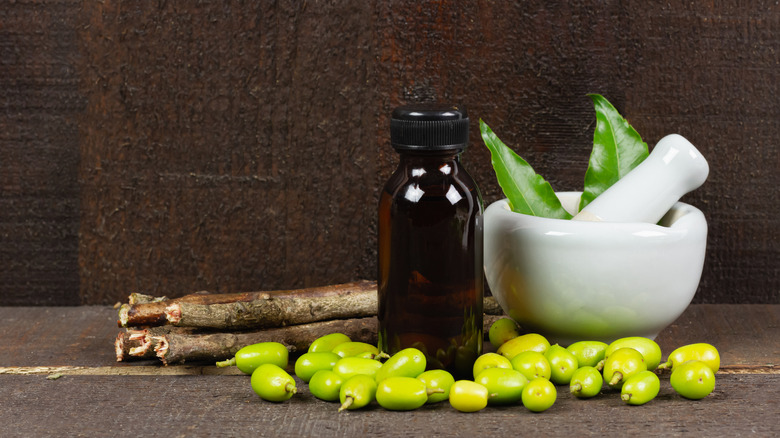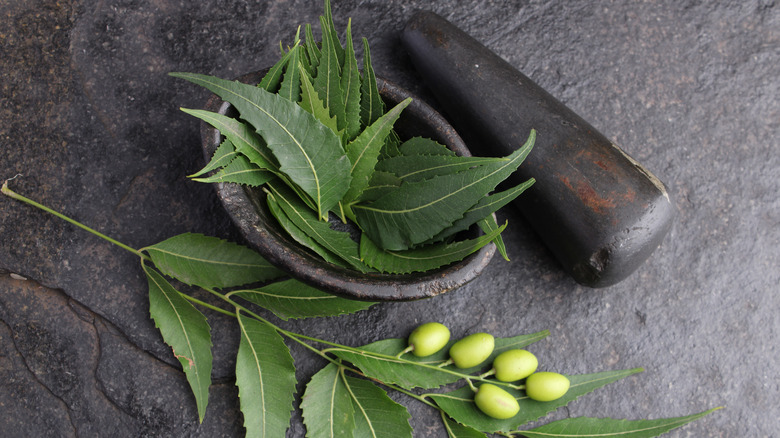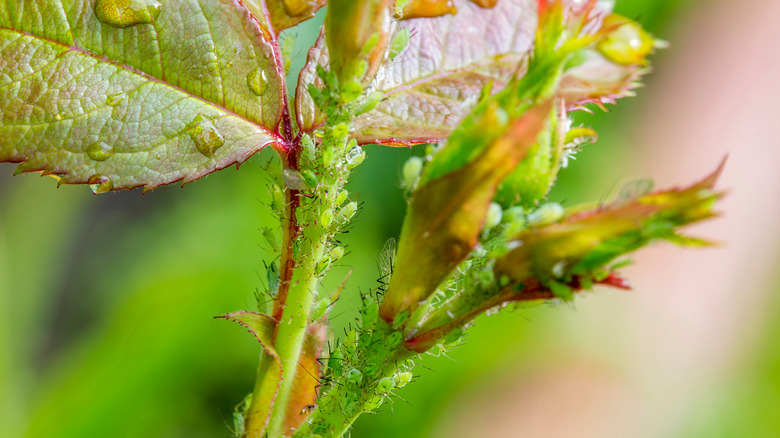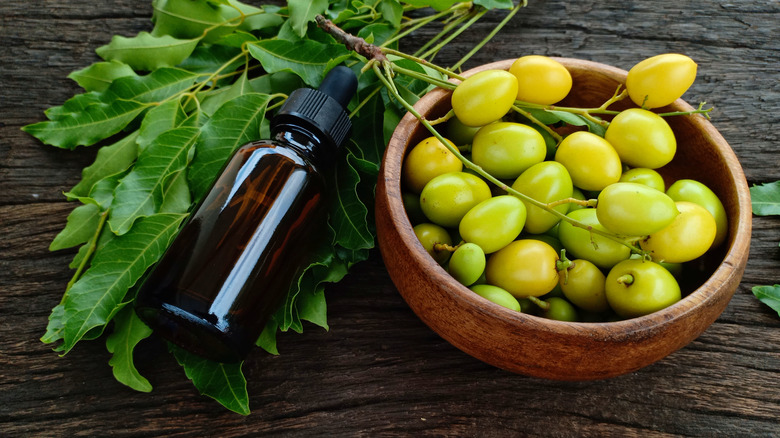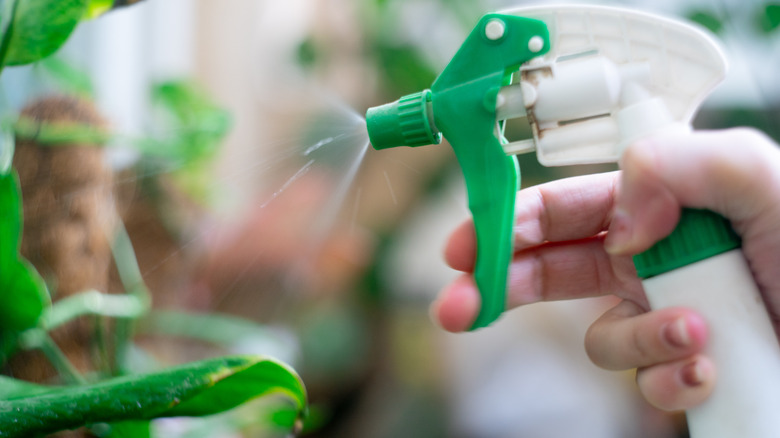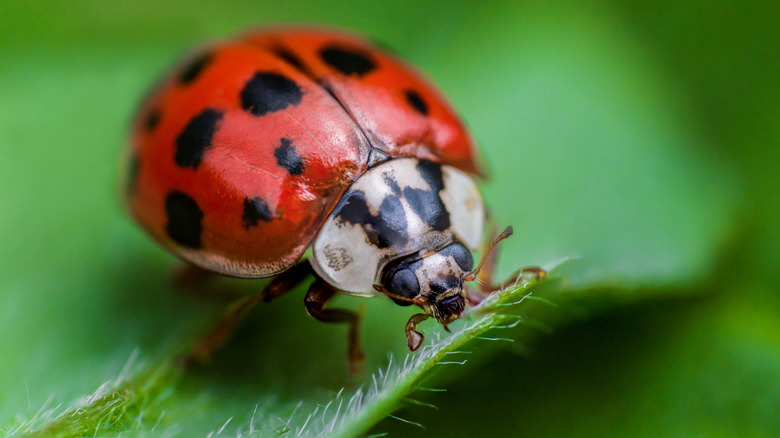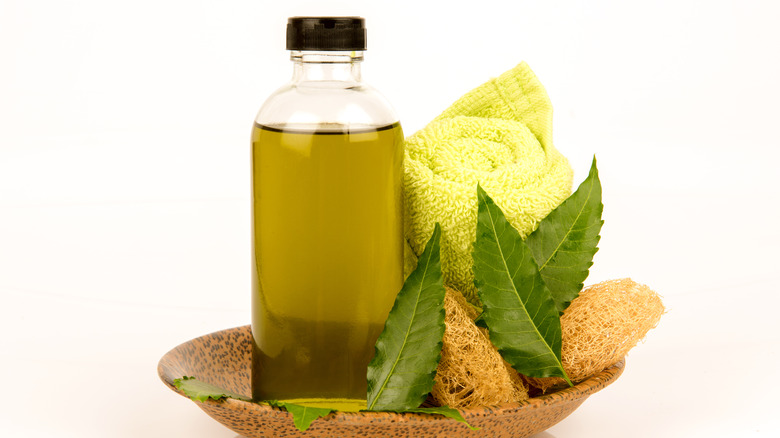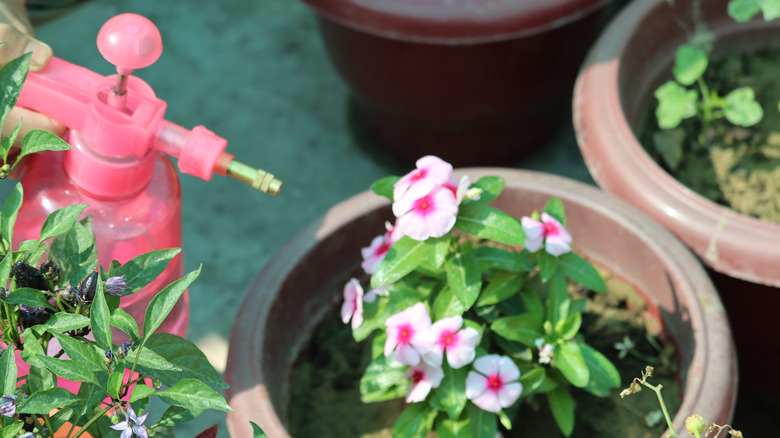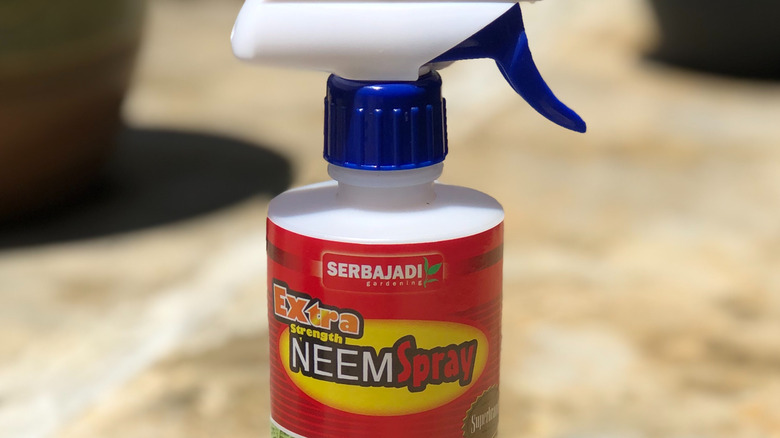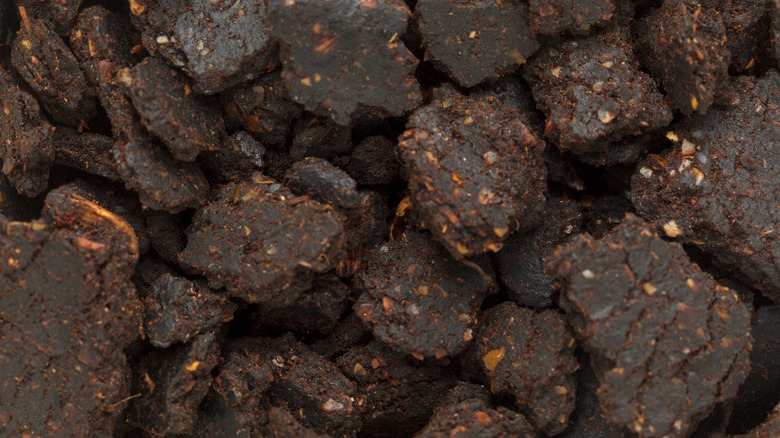What Is Neem Oil And How Can You Use It In Your Garden?
Many gardeners who've dealt with bug infestations have turned to neem oil as a natural way to rid their yard of pests. A natural insecticide that's been used for thousands of years, neem oil is effective against some of plants' worst enemies, including aphids, scales, and spider mites. It can help keep these destructive pests at bay or help remedy a difficult infestation the same way a chemical pesticide would.
Among the many benefits of using neem oil in the garden is that it's organic, largely considered safe to use, and non-toxic to humans and animals. You can readily purchase neem oil pesticides at gardening centers, through online stores, or try making a DIY batch at home. Learn all about this miracle substance and its many uses for plants.
What is neem oil?
Neem oil is derived from evergreen neem trees (Azadirachta indica), which according to the University of New Hampshire, grow in tropical rainforests in South and Southeast Asia. Neem trees are native to Burma, India, and Sri Lanka, where their oils have been used as an insecticide for centuries.
Raw neem oil is made by crushing neem seeds to extract the oil, which is then mixed with a solvent, Safer Brand writes. It's both organic and biodegradable, making it a favorite option for gardeners who want a more natural way to get rid of pests. The active ingredient in neem oil is Azadirachtin, a chemical that can disrupt bugs at all stages of development. In its raw form, neem oil is brownish yellow and has a garlicky odor.
Which pests and diseases does neem oil help curb?
If you're wondering which pests neem oil will work against, there are quite a few. This is helpful if you're battling multiple infestations. Smiling Gardener has an extensive list of the bugs neem oil will help eradicate. Common garden enemies it can kill include aphids, cutworms, whiteflies, Japanese beetles, grubworms, termites, and scales. Safer Brand also reports that neem oil can help curb destructive nematodes.
Along with pest control, neem oil can also act as a fungicide. Black spot, rust, powdery mildew, leaf spot, anthracnose, and blights are fungal diseases that neem oil can assist in curbing. It can also help with certain bacterial diseases, like fire blight.
How neem oil works
Neem oil repels insects in a few different ways, depending on the pest's life stage. According to the National Pesticide Information Center, neem oil's active ingredient, azadirachtin, both repels and kills insects, but it does not always kill them on contact. The Daily Journal reports that once ingested, neem oil disrupts the hormones that remind bugs to eat, suppressing their urge to munch on leaves and eventually causing them to starve. It also stops bugs from sending out pheromones that attract mates, and if they lay eggs, they won't likely hatch or grow. Finally, neem oil coats immature insects, causing them to suffocate (via the University of New Hampshire).
Why you should use neem oil
If you're looking for a tried-and-true method to curb pests in your garden, then neem oil should be a frontrunner. It's been used in traditional farming in South Asia for thousands of years, The Borgen Project notes, and for a good reason. While some chemical pesticides can be harmful to humans, beneficial insects, and the environment, neem oil is organic, extracted from trees, and safe to use around humans and pets. When used correctly, it will have a low impact on your garden's beneficial insects while eradicating a wide range of pests along with some fungal and bacterial diseases.
Is neem oil safe?
Neem oil is largely considered safe to use in the garden. Before spraying it on your plants, do a test run on a few leaves. If they are fine the next day, you should be good to go. Neem oil is said to be non-toxic to humans, and it is used in household products from haircare to toothpaste. Avoid contact with your eyes, and do not directly consume neem oil products, Gardening Know How cautions. Wash anything you intend to eat that's been sprayed with neem oil. Studies about neem oil's effects on pregnancy and fertility are underway, so using additional caution is advised. And as always, be sure to follow the package instructions when you use it.
According to Smiling Gardener, if you're spraying large amounts of neem oil, be mindful of runoff or if it's draining into waterways as it can be harmful to fish and other sea life.
Will neem oil harm beneficial insects?
As an insecticide, neem oil does not target beneficial insects like butterflies, bees, or ladybugs. Since its active ingredient kicks in when pests ingest neem oil, leaf-sucking insects will be most affected by it. However, the oil can suffocate bugs when it's sprayed. According to Gardening Know How, neem oil smothers and suffocates insects on direct contact, including caterpillars and bug larvae. Spraying after sunset is advised to reduce harm to the bugs you want to keep in your garden.
Mosquitos also do not like neem oil and will be repelled by its scent (via Hittle Landscape). Underground, neem oil is actually beneficial to earthworms. Epic Gardening writes that while some pesticides can hurt worms, neem oil encourages their activity.
How to make your own neem oil insecticide
There are plenty of commercial neem oil products on the market, but if you take a DIY approach to gardening, try making your own batch of neem oil insecticide. The Spruce recommends purchasing pure, cold-pressed neem oil to ensure it's high in azadirachtin. Your neem oil solution will need an emulsifier to help the water and oil mix, so start by adding 1 to 2 teaspoons of liquid dish soap to 1 gallon of warm water and mixing well. Pour it into a sprayer and then add 1 to 2 tablespoons of neem oil and mix again.
The Spruce notes that you can also add a few drops of peppermint essential oil, which also repels some insects. Per Clean Air Gardening, homemade neem insecticide with raw neem oil will contain more azadirachtin than store-bought options, making it highly effective against pests. It's okay to experiment with how much neem oil you add to your solution within the 1-2 tablespoon range.
When to apply neem oil
According to The Spruce, you can apply neem oil during any planting season because it fights insects during all stages of their development. Some plants can be killed by neem oil, so do a test run before spraying. Garden Know How recommends testing a few leaves on different plant types to see how they react after 24 hours. If there's no damage, neem oil is okay to use.
Apply neem oil early in the morning or late in the afternoon when the sun isn't too bright. Morning or late afternoon applications won't interfere with beneficial insects buzzing about as well. You also don't want to use neem oil when it's too hot or too cold since it can add more stress to the plant.
How to apply neem oil
In the garden, spray your neem oil solution onto plants until they are fully saturated and dripping wet. Don't forget the underside of leaves, Homestead and Chill warns, because that's where many pests and diseases hang out. You'll likely need to do a few rounds of application. The Spruce recommends reapplying every week for infestations, and less frequently for preventative measures.
You can take a few different approaches to apply neem oil to houseplants. Plant Care for Beginners recommends either misting the oil with a spray bottle, wiping the solution onto leaves directly with a soft cloth or cotton balls, or spot-applying neem oil with a Q-tip. Each method works on different types of plants or the levels of infestations you're dealing with.
Types of neem oil insecticides
While you can make your own neem oil solution at home with the right ingredients, neem insecticide is also readily available in gardening stores. The National Pesticide Information Center writes that over 100 insecticide products on the market use neem oil. They come in many forms, including sprays, powders, dust, granules, and packed into cakes. Whichever type of neem product you buy, be sure to follow the directions closely. Neem oil pesticides are also readily available online and can also be found in most big box stores.
What are neem cakes?
According to Plant Care Today, when neem oil is extracted from neem trees, the leftover solids are sometimes packed into neem cakes. They can also be ground up into powders or granules. These cakes contain trace amounts of the beneficial ingredients in neem oil, like azadirachtin, making it a natural pesticide with antifungal and antibacterial properties.
Neem cakes can help curb nematode populations and kill grubworms and other underground pests when added to the soil. There are also plenty of essential plant nutrients in neem cakes, so it's a great NPK fertilizer, which is a fertilizer packed with nitrogen, phosphorus, and potassium (via Gardening Know How). They will help restore soil and act as plant food as well.
What are other uses of neem in the home?
If you have a bottle of pure neem oil at home, its uses go far beyond plant care. Neem oil can be found in many commercial products, from shampoo to toothpaste. Along with its anti-fungal properties, neem is rich in triglycerides and fatty acids, making it popular in hair and skin care treatments, Epic Gardening writes. MedicineNet notes that it can curb dandruff, soothe an itchy scalp, and promote hair growth. Healthline reports that it can also boost collagen, reduce wrinkles and scars, heal wounds, and treat acne. Be sure to research how to best use neem oil safely before using it in skin and hair care. It's also beneficial for pets. Neem oil can be found in shampoos and be used as a remedy to repel ticks and fleas.
